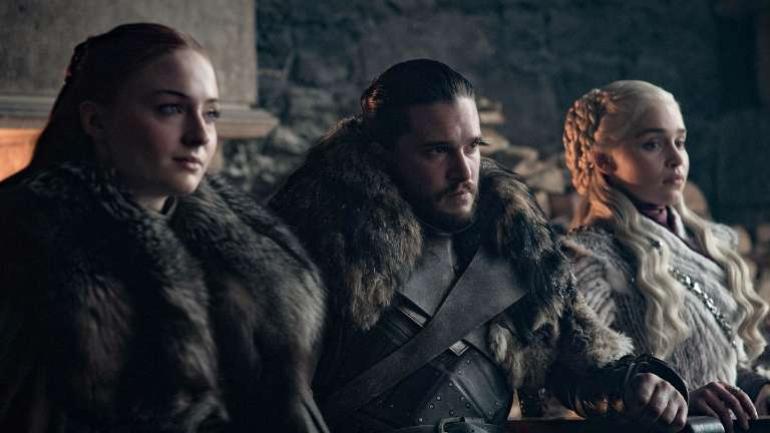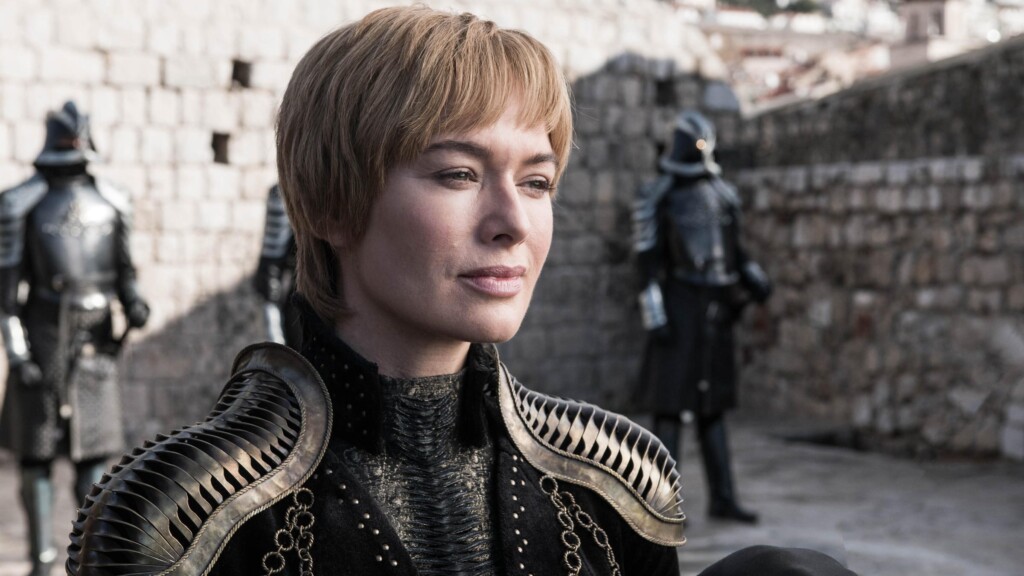The season premiere of Game of Thrones’ final season begins with a striking image: all the people of Winterfell, lined up to welcome the army of Daenerys Targaryen, countless masses of Unsullied and Dothraki. It’s a literalization of the cumulative effect this show uses in its storytelling. Here is the North and the South, uniting in grand scale. We see this through the eyes of Arya, and thanks to some terrific facial acting from Maisie Williams, we see the complicated emotions this produces: dismay that Jon doesn’t notice her, surprise and relief when she spies Gendry, awe at the sight of the dragons (one thing this show has always done spectacularly well is show us that not everyone is as used to the dragons as we are). It’s a solid opening, and the ominous music underscores what the characters must be feeling. This isn’t a victorious reunion. This is a tenuous alliance brokered by a man with no real authority to speak of, all in service of fighting a foe that by all accounts cannot be killed. There is a sense of hope, yes, but also of desperation and uncertainty.
This sense pervades most of “Winterfell,” which was a surprisingly talky episode to start a season with. It’s rare (maybe unheard of) to get a place-setting episode this early on in the season. Mileage will vary for each viewer, and I must admit to some feelings of boredom or frustration myself. But “Winterfell” has grown on me since I watched it last night. With a cast this big, it’s essential that you check in on just about everyone, because it’s so easy to lose track of all these oddly-named characters. This approach has its perils, and at its worst, “Winterfell” is tonally similar to the show’s fifth season, still the low point of Game of Thrones, when it felt as though the writers were running out of steam and just started throwing random characters together.
The thing is, though, without source material to work from these last three seasons, Game of Thrones is almost like high-grade fan fiction. That’s not necessarily a knock on the show; a more charitable interpretation is that the show is now an ekphrastic response to the books and less of an adaptation. Still, the feeling lingers. I’m re-watching the episode right now as I write this review. I paused it, and on my screen I see Brienne, Bran, Sansa, Daenerys, Davos, Jon, Jorah, Grey Worm, Missandei, and Tyrion (not pictured: Varys, Arya, Gendry, the Hound, Beric). There’s something to be said for the natural way with which all these characters have come together, but at times “Winterfell” feels very rushed. When I call this a talky episode, I’m trying to euphemize the fact that this is a very expository episode; indeed, one of the major questions the episode needs to answer is resolved by a character just blurting it out.

To be fair, even subpar Game of Thrones is at the very least more entertaining than just about anything on the air, and “Winterfell,” while it has its issues, is not strictly speaking a subpar installment. What works best is the sense of futility, the idea that no matter how noble their cause is, these men and women we’re rooting for are doomed to fail. This is displayed with nice subtlety in a scene where Sansa addresses all of the Stark bannermen. She calls for Lord Umber to step forth, and out comes a small boy. His army lacks even the horses and wagons needed to travel to Winterfell. Sansa worries that the north has insufficient food for Dany’s army, not to mention the dragons (Sansa: “What do dragons eat anyway?” Dany: “Whatever they want”).
Bran takes his new title of Three-Eyed Raven literally, and acts as a stormcrow for much of the episode. He has no patience for reunions or pomp and circumstance. He barely says hello to Jon before he’s imploring everyone to focus on the task at hand. Bran’s evolution as a character has been one of the show’s more daring attempts, and I’ve found it to be largely successful, even if Isaac Hempstead Wright relies a little too heavily on squinting his eyes in order to look mysterious. In a small way, Bran is the anchor here, and helps keep everyone grounded through their petty squabbles, of which there are more than a few.
Jon still thinks of Sansa as a little girl, and of Arya as someone who can be pitted against her sister (Jon, obliviously holding Needle: “Have you ever used it?” Arya: “Once or twice”). There’s tension between Sansa and Dany that is already threatening to boil over, which might be a bit too soon to be effective, even if it is keeping in line with the characters. Sansa has been through hell (and the show’s best character arc) to become Lady of the North, and is not going to let anyone take it from her. Dany, likewise, has been disrespected and underestimated her whole life, and wants a little more appreciation for showing up with the cavalry (plus dragons). Respect, or lack thereof, remains a convincing through-line in this series, and helps to humanize the characters.

This is arguably done best with how the show handles Cersei, who has now become the full-fledged supervillain the show always wanted her to be. When Qyburn informs her that the dead have breached the Wall, she icily replies, “Good.” Lena Headey looks stunning in her black raiments with gold epaulets, and outside of maybe the Night King, Cersei is now the scariest character on the show. But that doesn’t mean GoT forgets she’s a person, too. There’s a funny moment when she’s disappointed that the Golden Company, her newly hired mercenaries, arrived without elephants. And there’s a far sadder moment when she goes to bed with Euron Greyjoy, who treats her like the commodity she was thought of when she was married off to Robert Baratheon. (Pilou Asbaek might be too much for some viewers, but I like his strutting peacock of a villain, and he’s the only one who can convincingly match Cersei’s bravado.)
Overall, not a ton happens in “Winterfell.” The biggest moment comes when Sam reveals the truth of Jon’s parentage (poor Jon; any time he wants out, someone slaps a crown on his head). This lays the bedrock for a rift between him and Dany, as Sam asks, “You gave up your crown to save the people. Would she do the same?” That will make for a nice emotional anchor moving forward. The episode ends with a grizzled Jaime riding incognito into Winterfell, where the first person he sees is Bran, or the thing that looks like Bran.
“Winterfell” is somewhat of a mixed bag. Game of Thrones is, as the title suggests, a game, and it’s important to get the pieces in place so they can make their next logical moves. There are some nice moments of small humanity, places the show has always excelled. But there are some pacing issues, and at times the episode gets dragged down in exposition, and some truly unfortunate green screen work in Jon and Dany’s scenes together. In a strange way, though, this is the boldest way the season could begin, after a hiatus of twenty months: with the reminder that, at its core, this is a show about people, and not all of those people will make it out alive. It’s time to say goodbye.
4/5
A Few Thoughts
- Great sight gag when Drogon is watching Jon and Dany make out, staring daggers at Jon like a resentful would-be stepson.
- This has been covered elsewhere, but goddamn Bella Ramsey is magnificent as Lyanna Mormont. In another universe, she is absolutely murdering the role of Arya Stark.
- Unexpectedly great comic timing from Emilia Clarke, as Dany realizes she’s meeting someone whose father and brother she had burnt alive.
- This show gets a lot of grief because it’s popular, but it’s also good. Like, really damn good. When Game of Thrones is firing on all cylinders, nothing can match it. I’m having a hard time thinking of another show that could pull off, or would even attempt, the development that Jaime and Sansa have seen.

